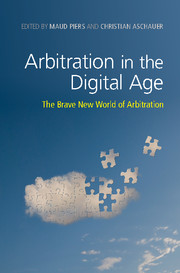Book contents
- Arbitration in the Digital Age
- Arbitration in the Digital Age
- Copyright page
- Contents
- Contributors
- Foreword
- Introduction
- 1 Survey on the Present Use of ICT in International Arbitration
- Part I The Use of Technology in International Arbitration
- Part II Arbitration, Arbitrators, Counsel and the Internet
- 7 E-Arbitration Agreements and E-Awards: Arbitration Agreements Concluded in an Electronic Environment and Digital Arbitral Awards
- 8 Building on OArb Attributes in Pursuit of Justice
- 9 Legislating for an Effective and Legitimate System of Online Consumer Arbitration
- 10 Arbitrators and Their Online Identity
- 11 How Online Sources Affect Counsel Strategies and Behavior in Arbitration
- 12 Conclusion
- Index
10 - Arbitrators and Their Online Identity
from Part II - Arbitration, Arbitrators, Counsel and the Internet
Published online by Cambridge University Press: 12 January 2018
- Arbitration in the Digital Age
- Arbitration in the Digital Age
- Copyright page
- Contents
- Contributors
- Foreword
- Introduction
- 1 Survey on the Present Use of ICT in International Arbitration
- Part I The Use of Technology in International Arbitration
- Part II Arbitration, Arbitrators, Counsel and the Internet
- 7 E-Arbitration Agreements and E-Awards: Arbitration Agreements Concluded in an Electronic Environment and Digital Arbitral Awards
- 8 Building on OArb Attributes in Pursuit of Justice
- 9 Legislating for an Effective and Legitimate System of Online Consumer Arbitration
- 10 Arbitrators and Their Online Identity
- 11 How Online Sources Affect Counsel Strategies and Behavior in Arbitration
- 12 Conclusion
- Index
Summary
The issue of arbitrators and their online identity is one that is rather untapped. The use of new technologies, in particular, mobile devices in combination with new ways of communication via social media networks, has added another dimension to the everlasting hot topic of arbitrators’ independence and impartiality. The arbitrators’ online identity proliferates the transparency of arbitrators’ performance, reputation and profile in general. With the rapidly growing virtual population and accessibilities of the biggest worldwide territory, the Internet, guidance concerning arbitrators’ online behaviour is welcomed. The author puts forward that certain inspirations concerning arbitrators’ online behaviour may be derived from their offline behaviour while applying a nuanced use of social media networks in order to protect arbitrators’ online identity.
- Type
- Chapter
- Information
- Arbitration in the Digital AgeThe Brave New World of Arbitration, pp. 246 - 271Publisher: Cambridge University PressPrint publication year: 2018

